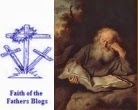Saint Jerome (also known as Eusebius Hieronymus Sophronius; Girolamo; Hieronymus; Man of the Bible) is a Latin Father of the Church and a Doctor of the Church. Saint Jerome was born to a rich pagan family in 347 A.D. at Strido, Dalmatia. He led a misspent youth. He studied in Rome, Trier, and Aquileia, and he became a lawyer.
He converted in theory, and was baptized in 365. He then began his study of theology, and had a true conversion. He visited Rome, studied at Trier and Aquileia, and in 373, Jerome set out on a journey to the East.
From 374 to 379 he led a life of seclusion and prayer in the desert of Chalcis. Jerome lived for years as a hermit in the Syrian deserts. He was reported to have drawn a thorn from a lion's paw, and the animal stayed loyally at his side for years. Traveling to Antioch, he was ordained a priest. He was a student and friend of Saint Gregory Nazianzus, and through him came to study the Scriptures.
Jerome was secretary to Pope Damasus I who commissioned him to revise the Latin text of the Bible. After visiting Rome, and journeying through the Holy Land, he retired to a monastery in Bethlehem. There he prayed, fasted and labored on the Latin edition of the Bible. The result of his 30 years of work was the Vulgate translation, which is still in use.
He also engaged actively in controversy with Bishop John of Jerusalem, opposing the doctrines of Origen and Pelagius. Saint Jerome was the friend and teacher of Saint Paula, Saint Marcella, and Saint Eustochium. Saint Jerome's friendship with Saint Eustochium was an association that led to so much gossip, Jerome left Rome to return to the desert solitude. Saint Eustochium had traveled with Paula and Jerome to the Holy Land where she helped with the Vulgate Bible translation, working as Jerome's housekeeper, and by reading and writing for him when his eyesight began to fail.
Saint Jerome lived his last 34 years in the Holy Land as a semi-recluse. He wrote translations of Origen, biographies, histories, and much more. Saint Jerome died of natural causes in Bethlehem in 420, his remains are interred in the church of Saint Mary Major at Rome, and his relics are in the Sistine chapel of Saint Mary Major.
You can read Saint Jeromes "Book of Illustrious Men" by clicking here. He wrote about a large number of ecclesiastical writers in this volume, and it is an interesting read.
Saint Augustine of Hippo once wrote of Saint Jerome: "What Jerome is ignorant of, no man has ever known."
Below are some quotes from Saint Jerome:
I interpret as I should, following the command of Christ: "Search the Scriptures," and "Seek and you shall find." For if, as Paul says, Christ is the power of God and the wisdom of God, and if the man who does not know Scripture does not know the power and wisdom of God, then ignorance of Scriptures is ignorance of Christ.
No one should think that I mean to explain the entire subject matter of this great book of the prophet Isaiah in one brief sermon, since it contains all the mysteries of the lord. It prophesies that Emmanuel is to be born of a virgin and accomplish marvelous works and signs. It predicts his death, burial and resurrection from the dead as the Savior of all men. Whatever is proper to holy Scripture, whatever can be expressed in human language and understood by the human mind, is contained in the book of Isaiah.
Saint Jerome from a commentary on Isaiah
No one should think that I mean to explain the entire subject matter of this great book of the prophet Isaiah in one brief sermon, since it contains all the mysteries of the lord. It prophesies that Emmanuel is to be born of a virgin and accomplish marvelous works and signs. It predicts his death, burial and resurrection from the dead as the Savior of all men. Whatever is proper to holy Scripture, whatever can be expressed in human language and understood by the human mind, is contained in the book of Isaiah.
Saint Jerome from a commentary on Isaiah
* * *
In the remotest part of a wild and stony desert, burnt up with the heat of the scorching sun so that it frightens even the monks that inhabit it, I seemed to myself to be in the midst of the delights and crowds of Rome. In exile and prison to which for the fear of hell I had voluntarily condemned myself, I many times imagined myself witnessing the dancing of the Roman maidens as if I had been in the midst of them: in my cold body and in my parched-up flesh, which seemed dead before its death, passion able to live. Alone with this enemy, I threw myself in spirit at the feet of Jesus, watering them with my tears, and I tamed my flesh by fasting whole weeks. I am not ashamed to disclose my temptations, but I grieve that I am not now what I then was.
Saint Jerome's letter to Saint Eustochium
Saint Jerome's letter to Saint Eustochium
* * *
Saint Jerome
* * *
You say in your book that while we live we are able to pray for each other, but afterwards when we have died, the prayer of no person for another can be heard.... But if the apostles and martyrs while still in the body can pray for others, at a time when they ought still be solicitous about themselves, how much more will they do so after their crowns, victories, and triumphs?
Saint Jerome from Against Vigilantius, 406AD



